Pharma companies and research institutes all over the world are racing to deliver a safe and effective COVID-19 vaccine starting in Dec ‘20 and extending through 2021. The optimistic findings from phase 3 clinical trial data of two major vaccine candidates have raised hopes that the beginning of the end of the pandemic is in sight. However, significant challenges still need to be overcome before a vaccine becomes available to all. With wealthy countries placing their bet on multiple vaccine candidates, the middle and lower-income countries may face difficulty in getting equitable access to life-saving vaccines.Leading COVID-19 vaccine candidates
Leading candidates have recently announced impressive efficacy data based on phase 3 clinical trials, and have started applying for emergency use authorization. We take a look at a few such candidates that have initiated the approval process or are very close to it.
The final analysis of phase 3 trial data of Pfizer-BioNTech vaccine candidate has found that it was 95% effective in preventing COVID-19 infections. The candidate vaccine has been developed using mRNA technology that utilizes genetic material to generate an immune response. It has a storage requirement of minus 94 degrees Fahrenheit and can be stored in a regular refrigerator for 5 days.
The vaccine candidate consists of two shots that must be administered at an interval of 21 days. One of the major challenges of the Pfizer-BioNTech vaccine candidate is the requirement of special storage equipment and transportation. Pfizer has applied for emergency use authorization.
Initial pre-bookings for the vaccine:
- European Union: 30 crore doses (300 million)
- Japan: 12 crore doses (120 million)
- United States: 10 crore doses (100 million)
- United Kingdom: 3 crore doses (30 million)
- Canada: 1 crore doses (10 million)
- Australia: 1 crore doses (10 million)
- Chile: 1 crore doses (10 million)
Read more about this vaccine here. The preliminary analysis of phase 3 clinical trial data of Moderna’s vaccine candidate has found that it was over 94% effective in preventing COVID-19 infections. The vaccine candidate consists of two injections that must be administered at an interval of 28 days. Like the Pfizer-Biotech vaccine candidate, it has been developed using the mRNA technology. However, this vaccine remains stable at 36 to 46 degrees Fahrenheit and can be stored in a standard refrigerator for nearly 30 days. It can be stored at negative 4 degrees Fahrenheit for 180 days.
Initial pre-bookings for the vaccine:
- United States: 10 crore doses (100 million)
- United Kingdom: 5 crore doses (50 million)
- Japan: 5 crore doses (50 million)
- Canada: 5.6 crore doses (56 million)
- Switzerland: 45 lac doses (4.5 million)
Read more about this vaccine here.
- University of Oxford-Astrazeneca
The University of Oxford and UK-based pharmaceutical giant AstraZeneca’s COVID-19 vaccine candidate is likely to make their phase 3 clinical trial efficacy by the end of 2020 or early 2021. Recently, AstraZeneca announced that its vaccine generated a similar immune response in both older and younger individuals. The AstraZeneca-Oxford vaccine candidate requires two doses to generate an immune response. The vaccine can be stored at regular refrigerator temperature.
Initial pre-bookings for the vaccine:
- United States: 50 crore doses (500 million)
- India: 50 crore doses (500 million)
- European Union: 40 crore doses (400 million)
- United Kingdom: 10 crore doses (100 million)
- Japan: 10 crore doses (100 million)
- Indonesia: 10 crore doses (100 million)
- Brazil: 10 crore doses (100 million)
Read more about this vaccine here. J&J’s COVID-19 vaccine candidate is currently in phase 3 human trials and has been developed using technology based on gene carriers (adenovirus vectors). The same technology was used by the company to develop the Ebola vaccine. The vaccine can be stored at standard refrigeration temperatures. J&J is researching the viability of both a single-dose as well as two-dose vaccines.
Initial pre-bookings for the vaccine:
- European Union: 20 crore doses (200 million)
- United States: 10 crore doses (100 million)
- Canada: 3.8 crore doses (38 million)
- United Kingdom: 3 crore doses (30 million)
Read more about this vaccine here. COVID- 19 vaccines for lower and middle-income countries
In light of the prevailing conditions, various international agencies led by the World Health Organization have joined hands to launch Access to COVID-19 Tools (ACT) Accelerator. It is a global collaborative initiative that aims to ensure equitable access to a COVID-19 vaccine once it is available.
COVAX is a pillar of ACT Accelerator whose objective is to accelerate the development and manufacture of COVID-19 vaccines. It is co-led by the WHO, Gavi, and the Coalition for Epidemic Preparedness Innovations (CEPI).
COVAX has two major components:
It is the procurement mechanism of COVAX. The facility is making investments across a wide range of promising vaccine candidates. It works by pooling purchasing power from all participating countries. This will ensure that all the participating countries have access to a safe and effective COVID-19 vaccine as soon as it gets regulatory approval. COVAX Facility is guided by the WHO’s fair allocation framework.
- COVAX Advanced Market Commitment (AMC)
This is the financing mechanism of the COVAX. The main objective of COVAX AMC is to ensure equitable access to COVID-19 vaccines, irrespective of the income level of countries. The mechanism will support the participation of lower and middle-income countries in the COVAX Facility. It needs an investment of US$ 2 billion by the end of December.
Conclusion
Developing a vaccine against COVID-19 is the most pressing challenge confronting humanity. With rich countries pre-booking supplies of potential COVID-19 vaccines, the lower and middle-income countries are also joining alliances to ensure they are not left out. It is important to note that the pandemic will not end until a significant portion of the global population is vaccinated. This would not be possible without equitable access to a vaccine. Nobody is going to win the “vaccine race” until everybody wins.
Follow all these developments and more at Apollo 247’s COVID-19 Vaccine Tracker.







